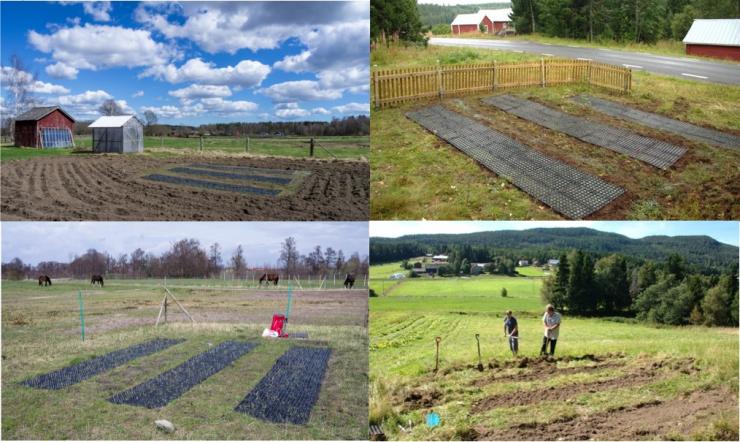France
July 26, 2022
>> Des gènes au microbiote des plantes
Like humans and animals, plants also have a microbiota. A research team led by the University of Chicago, and involving INRAE, studied whether the genetic variability within a plant species controls the composition of its leaf microbiota. The researchers planted more than 30,000 plants in experimental set-ups at four sites over two years to analyse variation in the leaf microbiota and reproductive success, estimated through seed production, of 200 genotypes of a model plant. Their results, published on July 22th in PNAS, show that genetic variation between plants has a particular impact on specific microorganisms, which in turn have a strong influence on the composition of microbial communities. This influence on microbial communities contributes to the reproductive success of different plant genotypes.
Like animals, plants have a microbiota composed of multiple microorganisms that organise themselves into communities with competitive, predatory or symbiotic relationships. The presence of certain microbes within plant tissues, as well as their diversity, can have a beneficial influence on the plant by giving it, for example, a better capacity to fix nutrients or to better defend itself against pathogens. Conversely, can the plant influence the composition of its microbiota? To find out, the scientists explored whether and how the genetic variability naturally present in the model plant Arabidopsis thaliana influences the microbial communities in its leaves.
A study on 30,000 plants
The research team's objectives were to identify the target microorganisms of the plant's genetic control, to identify the genes involved in this control, and to estimate the impact of this influence on seed production, an important component of reproductive success in this annual plant species. To do this, they planted genetically identical copies of 200 Arabidopsis thaliana genotypes in eight experimental set-ups at four sites in northern and southern Sweden. The scientists collected leaves from nearly 8,000 plants and characterised the microbial communities using the metabarcoding DNA sequencing method, which allows the DNA of a sample to be analysed in its entirety and to identify the different species of organisms present. They used more than 20,000 of the remaining plants for a comparative analysis of seed production between the different genotypes. Their results show that genetic differences between plants of the same species influence the composition of the leaf microbiota regardless of the environment in which the plants have lived.
 The experiments on the sites in the north (right) and the south of Sweden (left) in 2011. Our experiments were organized in three complete randomized block designs, that is all the blocks included several copies of the 200 genotypes of Arabidopsis distributed randomly. Each experiment included approximately 4700 plants.
The experiments on the sites in the north (right) and the south of Sweden (left) in 2011. Our experiments were organized in three complete randomized block designs, that is all the blocks included several copies of the 200 genotypes of Arabidopsis distributed randomly. Each experiment included approximately 4700 plants.
An influence of the plant genotype on specific microorganisms
Microbial communities are organised around structuring microorganisms that have a major influence on their composition. The results of the study show that it is on these structuring microorganisms that the plant genotype has the greatest influence. In particular, these microorganisms have an influence on the growth and reproductive success of the different plant genotypes. The study shows that this genetic influence of the plants on these structuring microorganisms explains about 10% of the variability in seed production between the different Arabidopsis thaliana genotypes at the four sites and during the two years studied. By sequencing the genomes of 200 Arabidopsis genotypes, the researchers identified genes and functions involved in the variation of microbial communities between the different genotypes. Their results suggest the implication of genes involved in the plant immune system, but also the production of specialised metabolites, often involved in the response mechanisms to different stresses that the plant may undergo.
These results open up new perspectives for the study of the genetic diversity of plants; it would be possible to conserve or enhance genotypes on the basis of their capacity to favour the presence of certain beneficial microorganisms that contribute to the adaptive potential of populations or to maintain various ecosystem services (biomass production, better resilience to constraints).
Reference
Benjamin Brachi, Daniele Filiault, Hannah Whitehurst, Paul Darme, Pierre Le Gars, Marine Le Mentec, Timothy C. Morton, Envel Kerdaffrec, Fernando Rabanal, Alison Anastasio, Mathew S. Box, Susan Duncan, Feng Huang, Riley Leff, Polina Novikova, Matthew Perisin, Takashi Tsuchimatsu, Roderick Woolley, Caroline Dean, Magnus Nordborg, Svante Holm, Joy Bergelson, Plant genetic effects on microbial hubs impact host fitness in repeated field trials, PNAS July 22, 2022, 119 (30) e2201285119, https://doi.org/10.1073/pnas.2201285119